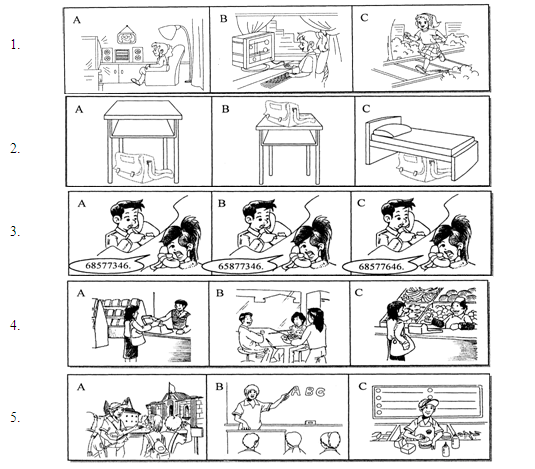- 听力试题
- 听力原文
- 听力答案
Ⅰ. 听力测试(共三节,20小题,满分25分)
第一节:听描述或对话, 选图画。听下面2段描述和3段对话。听完以后,从A、B、C三幅图画中选出正确的一幅。每段描述和对话读一遍。(共5小题,每题1分,计5分)

第二节:听对话,选答案。听下面4段对话。根据所提的问题,从A、B、C三个选项中选出最佳答案。每段对话读两遍。(共10小题,每题1分,计10分)
听第六段材料,完成第6、7小题。
6. What show is Paul watching?
A. A TV play. B. Music videos. C. A football match.
7. Why doesn’t Paul’s grandma sit down and watch?
A. Because she is tired.
B. Because she has watched it.
C. Because she doesn’t like what
听第七段材料,完成第8至10小题。
8. Where will the two speakers go for the picnic?
A. In James’ house. B. In the mountain. C. In the park.
9. How will the two speakers go there?
A. By bike. B. By boat. C. By bus.
10. Who will go w ith the two speakers?
A. Jacky. B. Betty. C. James.
听第八段材料,完成第11、12小题。
11. Why doesn’t the man like his job?
A. Because he feels lonely.
B. Because he has to work at night.
C. Because he meets all kinds of people.
12. Where does the man want to work?
A. At the Great Wall Hotel.
B. At the Garden Hotel.
C. At the Golden Hotel.
听第九段材料,完成第13至15小题。
13. What time did Mr. and Mrs. Taylor get up yesterday?
A. At five. B. At six. C. At half past six.
14. What kind of farm work did Mr. Taylor do this morning?
A. Milked the cows.
B. Collected the eggs.
C. Watered the vegetables.
15. How often does Mr. Taylor milk his cows?
A. Twice a day. B. Three times a day.
C. Once a day.
第三节:听短文,选答案。听下面一段短文。根据短文内容选出最佳答案。短文读两遍。(共5小题,每题2分,计10分)
16. When do some students take jobs in
A. After school.
B. During the winter holidays.
C. During the summer holidays.
17. How old must the students be if they want to take jobs?
A. At 18 years old.
B. At least 16 years old.
C. More than 16 years old.
18. Where do the students find jobs?
A. In business centers.
B. In police stations.
C. In factories.
19. How long do the students work a day?
A. Five or six hours.
B. Eight hours.
C. Both A and B.
20. Why can some students take jobs at that time?
A. Because many of the workers want to go abroad to spend their holidays.
B. Because many of the workers are tired and want to stay at home.
C. Because the students want to make money for their daily life.